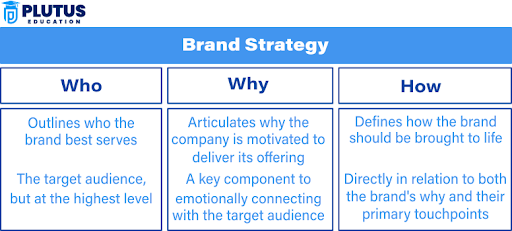Brand concept is the unique idea or set of associations that define a brand’s identity and purpose. It serves as the blueprint for how a business presents itself to its target audience, providing a foundation for customer relationships and loyalty. A brand concept is not just about visual elements like logos or taglines; it encompasses the emotional and psychological attributes associated with the brand, differentiating it from competitors. For a company to gain the courage to stand out, reach its customers, and sustain long-term success in today’s competitive business landscape, it is important to understand and implement a good brand concept. This comprehensive article delves into the meaning, types, and importance of the brand concept, exploring how it influences businesses and consumer behavior.
What is Brand Concept?
The central idea of a brand concept is the idea that lets a brand function distinctly, providing values and promises. All the activities convey both the functional and emotional aspects that a brand has to deliver to its audience. Based on this concept, all branding activities work as a guiding principle that will enhance the conveyance of business purpose with consistent relationships with customers.
- Nike uses “Just Do It” as a brand concept for delivering empowerment along with athleticism.
- Coca-Cola represents happiness and sharing, and the brand uses this to create an.
Types of Branding
Branding is creating a unique identity that differentiates a business from others. Different types of branding focus on various aspects of a business or person.
Corporate Branding
Corporate branding is a broad image of an organization. It is more about the mission, vision, and values of the company rather than being about the individual products or services.
Example
- Corporate branding for Apple communicates a message of innovation and design.
- Microsoft brands itself as a technology and productivity solution leader.
Product Branding
Product branding emphasizes individual products or services, giving them unique identities that resonate with specific target audiences.
Example:
- Dove focuses on personal care, emphasizing self-esteem and natural beauty.
- Lay’s highlights fun and variety in its branding for snack lovers.
Personal Branding
Personal branding is the process of developing a unique identity for an individual. It is commonly used by celebrities, entrepreneurs, and influencers to develop personal relationships with their audience.
Example:
- Oprah Winfrey is inspirational and empowering as a personal brand.
- Elon Musk represents innovation and futuristic thinking.
Service Branding
Service branding aims to produce a consistent and exceptional customer experience. It is a core value for businesses that have customer satisfaction as their main practice.
Example
- Airbnb: a memory-making travel company.
Digital Branding
Digital branding is the use of online platforms such as websites, social media, and email campaigns to establish and grow a brand.
Example:
- Spotify uses digital branding to emphasize personalized music experiences.
- Netflix highlights convenience and quality content through its digital presence.
Difference Between Brand Concept and Company
A brand concept and a company are closely related but distinct in their nature and functions. Understanding these differences helps businesses effectively align their operational goals with branding strategies.
| Aspect | Brand Concept | Company |
| Nature | Intangible emotional and psychological ideas. | A tangible legal entity operating the business. |
| Focus | Customer perception and loyalty. | Profitability, operations, and compliance. |
| Function | Connects emotionally with customers. | Conducts day-to-day business activities. |
| Example | Nike’s concept is empowerment. | Nike Inc. manages design and production. |
Different Brand Name
While choosing the most appropriate brand name is one of the critical considerations in branding, a brand name should be meaningful to the concept of the brand, appealable to the audience, and at the same time, memorable to the customer.
- Invented Names: Novel and Creative, without any pre-existing connections. Example: Google, Kodak.
- Evocative Names: Evoke emotions or images. Example: Amazon (immensity and plenty).
- Geographical Names: Situate the origin or regional connection. Example: Himalaya (naturopathic wellness).
- Acronyms: Make long words shorter. Example: IBM (International Business Machines).
How to Brand?
To make a good brand, it involves a strategy where creativity, understanding of the market, and consistency are used to create the desired brand.
- Define the Brand Concept: Define the purpose, mission, and values of the brand. This basis sets the focus on all branding activities.
- Understand the Target Audience: Use market research to understand what consumers want and need.
- Develop a Unique Identity: Create a logo, select colors, and craft a tagline that reflects the brand concept.
- Tell a Compelling Story: Use storytelling to establish an emotional connection. Highlight how the brand addresses customer needs or solves problems.
- Consistent Implementation: Apply the branding across all touchpoints, including packaging, advertisements, and online platforms.
- Evaluate and Refine: Regularly analyze brand performance through customer feedback and adjust strategies as needed.

Importance of Brand Concept
The brand is not only a marketing strategy, but it’s the foundation of a successful business strategy. Branding helps change how consumers perceive it, builds trust, and thus gains a competitive advantage.
Recognition
A strong brand is identifiable in a market. Customers are drawn to familiar brands, and this is a vital consideration in their purchase decisions. For instance, the golden arches of McDonald’s are identifiable anywhere in the world.
Customer Loyalty
A good brand idea creates an emotional connection. Such connections are associated with repurchase and positive word-of-mouth. Loyal customers are more likely to speak well of the brand to other people, which increases its diffusion.
Trust and Credibility
A brand with a high reputation will communicate reliability. This means customers feel secure purchasing from a brand that they trust, especially when operating in a highly competitive or risk-orientated business like technology or healthcare.
Competitive Edge
A creative and unique brand idea separates one business from the competition. It will draw the customer who fits into the values and proposition of the brand.
Premium Pricing
Strong brands command a premium price because of perceived value. Customers are willing to pay more for products that carry quality, status, or emotional satisfaction. Employees take pride in working for a reputable brand. Strong branding boosts morale, increases retention, and attracts top talent who want to be part of the brand’s success.
Consistency Across Channels
A consistent brand ensures that marketing efforts strike a chord with customers at different touchpoints. From packaging to online presence, consistent branding helps in strengthening recall and trust.
Improved Marketing Impact
A defined brand concept is sure to enhance the impact of marketing campaigns. It gives a clear narrative that speaks to the audience, ensuring better engagement and conversion rates.
Brand Concept FAQs
What is the brand concept?
The brand concept is the central idea that represents a brand’s unique identity, values and promises to its audience.
What are the main types of branding?
The main types include corporate branding, product branding, personal branding, service branding, and digital branding.
How does a brand differ from a company?
A brand is an emotional and psychological identity, while a company is a legal entity that manages business operations.
Why is branding important?
Branding creates recognition, trust, and loyalty among customers, which means business success.
How do I choose the right brand name?
Choose a name that relates to your brand concept, resonates with your target audience, and is easy to remember and pronounce.


